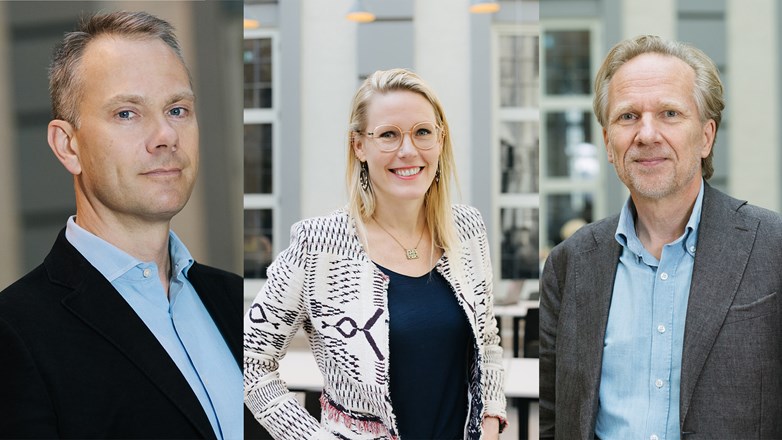SSE researchers receive SEK 54 million in funding from the Knut and Alice Wallenberg Foundation
From left to right: Alexander Ljungqvist, Anna Dreber Almenberg and Tore Ellingsen.
The Knut and Alice Wallenberg Foundation has chosen to fund 118 researchers for five years, providing up to SEK 18 million each for researchers in theoretical subjects. Out of these, three of the Wallenberg Scholars are from the Stockholm School of Economics. Professors Tore Ellingsen, Anna Dreber Almenberg and Alexander Ljungqvist all receive the amount of SEK 18 million each, enabling them to do important fundamental research.
How unselfish behaviors contribute to successful societies
Unselfish behaviors contribute to creating successful organizations and societies. But how you encourage unselfish behaviors is not a well-explored field. Tore Ellingsen will study the mechanisms and motivations behind unselfish behavior and how it contributes to successful societies. Ellingsen plans to develop a new theoretical framework for analyzing social duties and dutifulness. Through the lens of the theory, he aims to explore how laws, contracts, and informal agreements can promote unselfish behavior.
“Some duties are strict; they dictate what one should and should not do. Other duties are more liberal, suggesting what one ought to do. I believe that successful societies largely rely on liberal duties, as these duties are compatible with individualism and creativity. The realization that individualists are not necessarily selfish – in fact, they are often less selfish than collectivists – has been an eye-opener for me. This is an area where there is a lot of interest and quite limited fundamental research”, he says.
How to make research results more reliable
Anna Dreber Almenberg explores which scientific results we can trust. She has shown that many results do not replicate, meaning that when we redo studies we do not find support for the original results. In her coming study, Dreber Almenberg will study the causal effects of emotions on economic decision-making in high powered generalizable studies and explore credibility and replicability of non-experimental or quasi-experimental results. She will also explore the role of pre-analysis plans to make results from non-experimental data more reliable.
"With this Wallenberg Scholar grant, I will develop new ways to study and improve the credibility and reliability of scientific results. I will focus on the quantitative parts of the social sciences but many of the problems – and solutions – also apply to other fields,” she says.
The investibility of disruptive innovations
Alexander Ljungqvist will study the investibility of disruptive innovations in the United States over the past 250 years. As he notes, “Disruptive innovation often creates winners and losers. For example, the safety razor invented by King Gillette in 1904 put many barbers out of work. Workers and savers can, in principle, hedge against the risk of losing their jobs or savings due to creative destruction, by investing in the winners. But barbers couldn’t have hedged against this risk because Gillette’s invention wasn’t investible. My focus will be on the role of capital markets in cushioning the adverse effects of disruptive innovations. This will help us better understand the disruption that today’s artificial-intelligence breakthroughs or the energy transition may cause, and what policy interventions might be required.”
Basic research is typically defined as a systematic and methodical curiosity-driven search for new knowledge and ideas without immediate application in mind. Piece by piece, new knowledge is slowly but surely added. Although the primary purpose is not to find applications, basic research has often led to significant and important discoveries resulting in just that. But it also involves developing methods, conducting advanced calculations, and developing technology to interpret and process all collected data.




